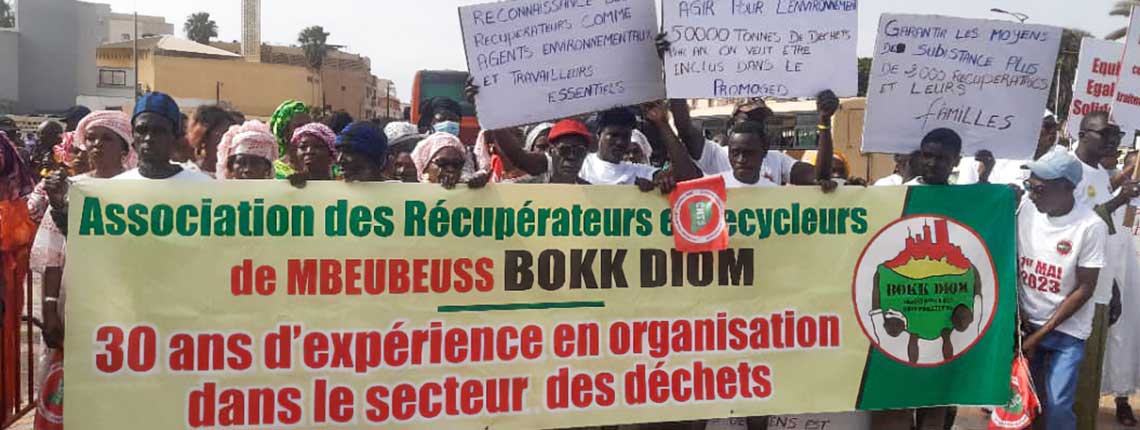The Association of Waste Pickers Bokk Diom demands that Senegal’s government keeps its promises of inclusion as the closure of West Africa's largest dump, Mbeubeuss, gathers pace. WIEGO’s local specialist, Maguette Diop, explains that the survival of thousands of workers and their families is more threatened than ever.
How do the latest measures threaten waste pickers’ livelihoods?
Waste pickers have not been properly included in the decision-making process of the Project for the Promotion of Integrated Management and Economy of Solid Waste (PROMOGED), nor have they been informed of the measures implemented at the dump since the project was launched in June 2021.
The latest measure, announced at the end of April, is forcing the immediate relocation of a significant number of waste pickers to another site at the dump, as well as the sale of their equipment, as it will be incompatible with the new facilities that the President is about to inaugurate. Construction of the facilities is due to last another three months, during which time waste pickers are expected to stop working – and thereby lose their income.
Historically, about 2,000 waste pickers and their families have depended on the dump to survive – and, in my opinion, this number has at least doubled since the start of the COVID-19 pandemic. The gradual closure of Mbeubeuss limits waste pickers’ access to the dump and means that they will lose their income.
These measures have come as a great shock to waste pickers as they contradict the pledges the President made on his first visit to Mbeubeuss in 2021. On that visit, he assured waste pickers that they would be taken into account in a new waste management system that would also ensure new health standards.
What has Bokk Diom done to demand waste pickers’ inclusion in the new solid waste management system?
On May 4, there was an unprecedented mobilization in Dakar, which was the result of general assemblies of waste pickers in the field. For the first time in its history, Bokk Diom mobilized itself to protest a measure taken by the authorities. I think the waste pickers have reached a level of organizational maturity that took the authorities by surprise. Bokk Diom was received by the Minister of Urban Planning, who listened attentively to them and recognized the validity of their demands, along the same lines as the President did in 2021. Waste pickers are now waiting for these reassuring words to materialize in concrete actions ensuring truly inclusive measures.
Waste pickers have organized press conferences and alerted the World Bank – one of PROMOGED's main sources of funding – of the project's non-inclusive approach. Bokk Diom, as a member of the International Alliance of Waste Pickers, and with the support of WIEGO, has also gained in visibility: their spokespersons are often asked to speak out on solid waste management or plastic pollution. I've also noticed a marked improvement in their treatment by the media, with more emphasis on their dignity and courage.
What are Bokk Diom's proposals to PROMOGED?
Waste pickers do not oppose the creation of a new solid waste management system. They oppose the lack of inclusion of their perspective in it and the sidelining of their work.
Bokk Diom would like to see transitional, humanized and structuring mechanisms put in place to enable waste pickers to continue working within an improved system, or at the very least, support to find alternative livelihoods.
Bokk Diom is calling for the recognition of waste pickers and of their right to work, so that changes in waste management can guarantee them a transition that preserves their livelihoods.
What is your personal opinion?
Representatives of waste pickers must be consulted and included as full partners, and funding mechanisms must ensure that livelihood protection plans are implemented.
In my view, the authorities would be well advised to build on the existing cooperative to create an effective and sustainable waste management policy, rather than trying to create a new system from scratch. The cooperative’s intention to invest in the entire chain of recuperation and processing of materials may facilitate that.
Among other options, why not secure the livelihoods of waste pickers by entrusting them with the management of the sorting centre? To do this, it will be necessary to create enabling conditions and give the cooperative time to consolidate itself as a public service provider. Also, accompaniment and other support such as technical training and subsidies should be provided. Waste pickers’ livelihoods need to be protected during a sufficiently long transitional period.
It seems to me that the cooperative has the capacity to do this. Experiences in other countries, such as Argentina, Colombia, Brazil and India, have shown that this is possible.
